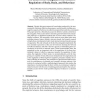Free Online Productivity Tools
i2Speak
i2Symbol
i2OCR
iTex2Img
iWeb2Print
iWeb2Shot
i2Type
iPdf2Split
iPdf2Merge
i2Bopomofo
i2Arabic
i2Style
i2Image
i2PDF
iLatex2Rtf
Sci2ools
124
click to vote
CONNECTION
2010
2010
The roles of the amygdala in the affective regulation of body, brain, and behaviour
Abstract. Despite the great amount of knowledge produced by the neuroscientific literature affective phenomena, current models tackling noncognitive aspects of behavior are often bio-inspired but rarely bio-constrained. This paper presents a theoretical account of affective systems centered on the amygdala. This account aims to furnish a general framework and specific pathways to implement models that are more closely related to biological evidence. The amygdala, which receives input from brain areas encoding internal states, innately relevant stimuli, and innately neutral stimuli, plays a fundamental role in motivational and emotional processes of organisms. This role is based on the fact that amygdala implements the two associative processes at the core of Pavlovian learning (CS-US and CS-UR associations), and that it has the capacity of modulating these associations on the basis of internal states. These functionalities allow the amygdala to play an important role in the regulation ...
| Added | 01 Mar 2011 |
| Updated | 01 Mar 2011 |
| Type | Journal |
| Year | 2010 |
| Where | CONNECTION |
| Authors | Marco Mirolli, Francesco Mannella, Gianluca Baldassarre |
Comments (0)

